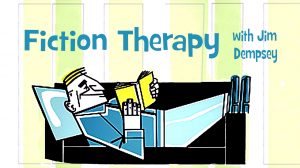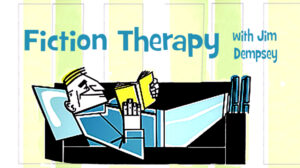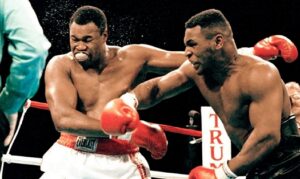Fiction therapy
When your readers engage with your novel, they go on a journey with your characters, through the twists and turns, the highs and lows. They gather up all the details as they go: our hero has two kids, her sister has vicious dog, her boss has been bankrupt twice, and we’re not sure if we can trust him this time either.
Readers take in these details as they go, almost like they’re gathering trinkets and storing them in the virtual backpack of their memory. The backpack gradually fills up as they make their way to the satisfactory (but, of course, not always happy) ending.
Problems can arise, however, when they get to that end and find that their backpack is full of things they didn’t need. We didn’t need to know the boss had been bankrupt before if his financial skills (or lack of them) don’t affect the main character. We don’t need to know anything about her sister’s dog if it doesn’t bite anyone or become tame as a result of some action in the narrative.
You don’t want to overburden your readers, so every detail has to count, and this is especially true of characters. Every one of them should have a role to play. Some characters are, of course, more significant than others, but each one – like each chapter, each paragraph, each sentence – should move your story forward in some way. Every character should affect the narrative and influence the actions of the main character(s).
Typical types
For those of you who have read some of the guidebooks on storytelling, you will probably have seen character roles described in terms of archetypes. Joseph Campbell, for example, talks about the trickster, shadow and shapeshifter in The Hero with a Thousand Faces
Many of these are based on the archetypes described by the psychoanalyst Carl Jung. He saw them as characters that could be universally recognized and part of the ‘collective unconscious.’ He spoke about the shadow as representing the dark side of a personality. Tricksters are clever but play by their own rules.
And we see archetypes in all stories. Siblings, for example, especially a twin, but even a childhood friend, can help to show what the main character’s life could have been like under different circumstances. Dominick and Thomas in Wally Lamb’s I Know This Much is True is a stark example of this, where one twin suffers from paranoid schizophrenia.
Children in a story can represent innocence and/or the need to protect that innocence. Heroes will often put their own lives at risk to save a child. Older characters, meanwhile, are seen as mentor’s to the younger hero. Sirius and Dumbledore in the Harry Potter stories, for example.
Your characters don’t always have to fit to archetypes, but being aware of them can help you define your characters’ roles in the narrative.
Character needs
Another way to make sure you don’t have any surplus characters to weigh down your readers is to map their roles in the story. This method can be quick and useful if, for example, you’re busy with NaNoWriMo this month.
It works like this: imagine you (or your main character) had to leave home and live overseas for a couple of years. What would you miss while you’re away?
Most of us think […]
Read MoreI work with a writer who is in a refugee camp. She’s been there for a while (I don’t know exactly how long), and she’s been in a few others along the way (I don’t know where or how many).
As you can imagine, she’s heard many stories from the other refugees on her journey. Some are harrowing, some violent, some heart-wrenching, some laugh-out-loud funny. She has a little notebook where she writes down many of these stories, simply because she loves stories like some people love exquisite chess pieces or Civil War memorabilia. She collects them.
Some elements of these stories enter into her own writing. She takes little bits from this one and details from that and combines them to make another story. Fiction, right?
But sometimes I’m not sure.
Her current novel is about a woman who has spent several years in refugee camps. It’s a fictionalized version of her own life, she says. And it’s an amazing story. Really stunning.
I don’t know many details about her life. I don’t know how long she’s been a refugee, why she ended up in a camp for so long, or why she left her country. I don’t think that any of that is my business. My business is editing, so I concern myself with the story on the page and not the one she’s experienced.
Usually.
Read MoreApologies in advance for the unpleasant imagery that follows.
Some years ago, I was traveling through Malaysia, and part of that meant a long bus journey. At one point, I really had to use the bathroom on the bus, but I’d been avoiding it the whole trip because I could smell that bathroom all the way to my seat near the front. But, as my old dad used to say, you cannot hold what is not in your hand. So, eventually, I had to go.
I tried to make the visit as short as I could – no longer than I could hold my breath. But that wasn’t short enough. In the moments I was in there, the bus took a sudden sharp corner. Physics took over and shifted the momentum to the back of the bus, concentrating its focus on me. I flew backwards through the bathroom door, breaking the thoroughly inadequate lock. I made enough noise as I went that it attracted the attention of everyone on the bus. Everyone. And I was in no state for an audience. But I had one anyway.
Although I can laugh about that story now, it remains a very embarrassing moment from my life. As I think back on it, picture myself there again, I can easily relive the sequence of emotions I went through. The shock, the surprise, the realization, the mortification, the contrition for what I’d put my fellow passengers (and now you) through, and my anger at the driver, the bus company, the tight corner and Newton’s laws of motion.
Memories
Most people recognize this idea of recalling an event that arouses the same feelings as in that past moment, even though you might be far removed from it now. This can be especially true of strong emotions. Remembering an argument, for example, can bring all that anger and frustration back again.
This can, of course, work for things you might not have a specific memory of. Imagine cutting open a lemon and biting right into it. Even if you’ve never done this, you can imagine the sensations you’d have in your mouth.
Read MoreWriters are fantasists. It’s pretty much part of the job description. Writers spend large parts of their days imagining scenarios, pondering what-ifs, and dreaming about stories and characters.
This fantasizing can spill over into real life too. Writers, like everyone else, envision new directions in their lives. We all have ambitions. We all have goals we’d like to achieve, whether it’s giving your Nobel acceptance speech or writing 500 words of your novel today.
And it feels good to imagine these things, to picture yourself on that podium or typing THE END on the last page of your book.
But imagining them and feeling good about achieving even relatively small ambitions doesn’t bring us any closer to actually achieving them. In fact, despite all the talk and self-help books about positive thinking, research by Gabriele Oettingen, a professor of psychology at NYU, has shown that positive thoughts alone are not enough and can actually detrimentally affect your chances of doing better in your career, your love life or even recovery from major surgery.
Does that mean it’s bad to fantasize about your future? No, says Professor Oettingen. It’s a good thing. It just needs to be tempered by a healthy dose of reality.
Read MoreI’ve spent virtually my entire life in the entertainment business, starting as a child in local amateur theater, then professional music, then this whole crazy book-writing thing. As different as these disciplines are, they have some core traits in common, chief of which is the need to please an audience. After all, if nobody comes to your show, or listens to your music, or reads your book, aren’t you just shouting into the void?
So a core trait that each successful artist has in common is that they do please their audience. The really successful ones please a really BIG audience.
But it’s never everybody.
Just as not everybody likes chocolate better than vanilla (because the ones who don’t are sadly wrong, but I digress…), not every artistic effort is going to resonate with or appeal to everybody. I think we all know this, deep down, but it’s helpful to remember that the most successful artists are often the ones who evoke the strongest reactions – but those reactions can actually be positive OR negative.
Don’t believe me? Look at the “Best Dressed” or “Sexiest” lists in some popular magazines or social media, and then look at the “Worst Dressed” and “Butt-Ugliest” lists (okay, there’s probably a gentler name for that last one, but let’s be honest: that’s what they’re implying). You’re going to find many of the same names on BOTH lists. Think about artists like Madonna. Lady Gaga. Adam Driver. Kanye West. People either love them, or they hate them. Rarely do these public figures evoke a “meh” reaction.
Um, no hugging, please.
My point is that some of the most successful artists have a truly polarizing effect. And I submit that’s a good thing. Something to aim for, even.
Striving to be inoffensive
I think it’s safe to say, many of us do not aim to polarize – either in real life, or with our fiction. Instead, we play it safe, tiptoeing around sensitive topics to avoid alienating or offending people. And this practice is reinforced constantly, when we see people complaining that entertainers and artists shouldn’t try to impose their opinions on their audience. “Just entertain me,” we are told, “don’t tell me what you believe, or what you think I should believe.”
I saw an example of this just recently, when a musician I’m acquainted with on Facebook posted in support of a regional politician he apparently admires. Personally, I hate the guy he supports, but it’s his FB page, not mine, so I stayed out of the conversation.
But lots of people didn’t. They chimed in from both sides, either praising or deriding his choice. But another sentiment quickly began to surface, which I’d been waiting for. Below is a paraphrased example:
“No matter what your political stance, it is never EVER a good idea to promote it when you are an entertainer, or in business! Never!”
Think about what this comment says to every artist – and even every business owner. In short: How dare you have an opinion? Your sole functions are to entertain me or serve me – and not offend me.
Let’s be honest: Many of us may have felt the same way when seeing an artist or celebrity voice a provocative or controversial […]
Read MoreA couple of years ago, a friend of mine was in a meeting to pitch his screenplay to a movie exec. My friend sold that plot with all the gusto he knew he needed in these rare moments. And he did well. He’d rehearsed that pitch till he could recite it backwards. On a tightrope. While juggling.
The exec was impressed. He picked up the screenplay from his desk and flicked through the pages. He turned to page 10. Not 8, 9, 11 or 12; 10. Then he turned to page 25. Again, not 24 or 26; 25. He put down the screenplay, the disappointment clear on his face.
“I don’t see the inciting incident or the shift to act two.” To this exec, the inciting incident comes 10% of the way into the story, and the main character crosses the threshold into act two at the 25% mark. No earlier, no later.
This is taking story structure to an extremely literal limit. It has to hit those beats, he reasoned, and it has to hit them at these exact times.
I wonder what this exec would have made of Alice’s Adventures in Wonderland. There, she sees the rabbit in paragraph two, by the fourth para, she’s down the rabbit hole. From inciting incident (seeing the rabbit) to crossing the threshold (going down the rabbit hole) in roughly the same amount of words as it’s taken me to get to this point in the article.
That’s how good a storyteller Lewis Carrol was.
But Carrol was writing at a time before there were whole libraries of books on story structure. The most popular among them being Story by Robert McKee, Save the Cat by Blake Snyder, my personal favorite, The Anatomy of Story by John Truby and The Writer’s Journey by Christopher Vogler.
Read MoreI’ve been updating the house style guide for Arkbound Foundation, where I’m on the board of trustees, and for its publishing arm, Arkbound. This means I’ve been reading various style guides over the last few weeks. These are generally dry documents that detail the publisher’s preferred spelling, punctuation, layout, reference formatting and even grammar choices.
Almost every time I edit for a new corporate client, I have to read through their guide and make sure the style is applied consistently throughout all their publications. And I love it. I’m fascinated by these proclamations that can range from a single page to a book as thick as a bible.
The The and the The
The word “bible” is a good example of something you might find in a style guide. Some of them would insist that “bible” always gets an initial capital letter, others would say only when referring to a specific bible, such as the King James Bible. Another example is whether to capitalize the t in “the” in that last sentence: The King James Bible.
This gets us into the much debated territory of whether it should be The Beatles or the Beatles, especially, say proponents of the former, since The Beatles is a registered trademark. I always wonder if it’s then more correct to say that John Lennon was a The Beatle rather than state that he was a Beatle. The way around that, and more accurate, I’d say, would be: John Lennon was a member of The Beatles.
Read More* sense of humor required
Warning: Hacks for Hacks tips may have harmful side effects on your writing career, and should not be used by minors, adults, writers, poets, scribes, scriveners, journalists, or anybody.
Despite all of your big talk about having lots and lots of writing time, you just couldn’t pull it together to finish your book. It’s okay to feel disappointed, but may I suggest you instead avail yourself of one of these handy, bulletproof excuses that will fend off any judgement from your writers group, your readers, and most importantly, yourself. Let the enabling begin!
As an author, you want your novel to be the best it can be. A top quality product means good reviews, word of mouth recommendations, which lead to increased sales. But just a few typos and grammatical errors will put readers off. Before they’ve even fallen over your plot holes, they’re filling message boards with mocking remarks about a couple of innocently misplaced hyphens or an occasional dangling modifier.
Most writers know this, and they diligently take time to search for editors who can check their manuscript for errors. But often a glance at the editor’s price list is enough to send an author clicking back to more fun ways to procrastinate. Suddenly, those increased sales seem a little too far down the line to justify the investment.
But you needn’t be intimidated by those price lists. In fact, there are many ways to cut the cost of a professional editor. Consider these five before you decide to stick with your potentially flaw-filled manuscript.
Don’t even send your second or third draft. Wait until you feel you can do no more with your story beyond changing that comma to a full stop and back again. It’s at that moment, when you feel you’re ready to publish your novel or send it to an agent, when you should, in fact, send your manuscript to a professional editor.
Unless you’ve been through a revision process with a story consultant or writing coach, then your first contact with an editor is likely to be for a developmental edit where you’ll get help with plot, structure, character development and flow, among other things. If these story elements aren’t already well established, you’ll be basically paying for the editor to help you rewrite, which will be time and money consuming. Revise as much as possible first, and you’ll definitely save on editing costs.
This is particularly important when dealing with editors who charge per word. But, generally, more words mean more work, so you’ll still win with editors who charge per hour.
It’s that simple. Except it’s not. Almost every author wants to reduce their word count but can’t choose which of their darlings to kill.
There are lots of articles on the web with tips to reduce your word count, but here’s one editing trick that can get rid of whole chapters: cut the backstory. Backstory is anything that happened before your main story started. You’re most likely to find it in the first pieces you wrote, those that have survived every redraft. That’s because you, the author, needs to know these specific incidents to understand the characters. That’s why you think they’re so important. In truth, the reader doesn’t need quite so much information and you’ve probably included the same details in a shorter and more subtle form elsewhere in the text.
These will be the most difficult cuts, but try it. Look out for those flashback scenes in particular and ask yourself if the reader, not you, really – really – needs those few hundred extra words.
There’s more to finding an editor than looking around for the cheapest. You’ve worked many long hours on your story, and there’s a lot of personal investment in every […]
Read MoreA well-edited novel will stand out from the crowd and command attention—and even help boost sales. Professional editing will not only correct errors, it can clear away the clutter, tighten up the plot, invigorate characters, and strengthen the author’s voice.
In last months’ article, I concentrated on how to find a good editor to help you improve your novel and on what makes a good editor. But why bother with an editor in the first place? Do you really need an editor
This time, I outline five reasons why I—as an editor—think you should hire a professional to edit your novel.
Editing is like housework, it goes unnoticed unless it’s not done.
Professional editing is an indispensable—not just a desirable—part of a novel’s journey to publication. Editing can make all the difference to getting a novel noticed by a prospective publisher and audience alike. An editor will make sure the reader remembers the dazzling plot and characterisation, and not the problems with grammar. Authors need editors, just as editors need authors. It takes teamwork to craft a polished and captivating work that could become tomorrow’s bestseller.
Lots of authors ask friends to take a look at their novel. Most people are flattered by the request and are happy to help.
While any feedback is welcome and can help improve the manuscript, friends tend to give a lot of positive feedback and encouragement. They can gloss over some of the novel’s shortcomings to avoid causing offence. And there could be those who are just a little bit jealous and who will gladly recount a whole list of failings.
Professional editors, on the other hand, are experienced at giving criticism. They are systematic and thorough, covering not only familiar issues of grammar and punctuation but also matters of style, pacing, dialogue, plot twists, and fact checking (to name but a few). Above all, the feedback they give is honest and objective.
Like the author, editors want your readers to be focussed on the narrative and not be distracted by misspelt words or absent apostrophes.
Read More* sense of humor required
Warning: Hacks for Hacks tips may have harmful side effects on your writing career, and should not be used by minors, adults, writers, poets, scribes, scriveners, journalists, or anybody.
Happy Quarantiniversary! Time flies, does it not? Now we’re one year into the pandemic, and many of you reading this have already been vaccinated. It’s time to celebrate not just the prospect of life returning to normal, but also your forthcoming literary success. When all this nonsense started, writers everywhere said, “This sucks, but at least I’ll have more time to write.” A whole year has gone by, and based on how much extra writing time you had, you must be putting the finishing touches on your novel, right? Right?!
Let me remind you of my advice from a year ago:
They say Shakespeare wrote King Lear during the plague. This is not inspirational; this is the baseline. Shakespeare didn’t have wifi. With the tools you have at your disposal, and with the abject terror you have as motivation, you should expect nothing less of yourself than to create an artistic masterpiece that high school English students will write formulaic essays about for the next several hundred years.
And now that you’ve put in all that hard work for the last twelve months, you get to reap the rewards. It must feel good, after a year of wondering whether you will live or die, to know that you at least have an artistic triumph to show for it. I mean, how bad would you feel if you hadn’t finished your book? It’s a good thing you’ve used all of this extra time at home wisely! Had you not done that, why, that would be enough of a failure to cause a full-blown existential crisis! Ha ha!
















